2019 年湖北武汉科技大学外语专业综合考研真题
Part A:
Comprehensive English
B. worry
C. alarm
B. arrange
C. balance
D. pacify
D. cultivate
B. responsive
C. inquisitive
D. perceptive
B. surrounded
C. darkened
D. blocked
I. Vocabulary. (25X1’=25 points)
Directions: In this part, there are 25 sentences, each with an underlined word or
phrase. Following each sentence are four choices marked A, B, C and D. Choose the
one that is closest in meaning to the underlined word or expression.
1.The chief functions of direct-mail advertising are to familiarize prospective
buyers with a product, its name, its maker, and its merits and with the product’
s local distributors.
A. potential
2. Jane and Tom have been able to reconcile their difference and are a happy family
again.
A. settle
3. Giving the child problems he can’t solve will only frustrate him.
A. baffle
4.When we were in the mountains, we often found ourselves entirely enveloped by
the fog.
A. confined
5. Perhaps more than anything else, it was onerous taxes that led to the Peasants
Revolt in England in 1381.
A. multiple
6. In ancient Egyptian paintings, royal figures were differentiated by making them
several times larger than others.
A. distinguished
7.The United States Food and Drug Administration has shown itself to be particularly
wary with regard to alleged “miracle” drugs in recent times.
A. bellicose
8.The plainer a bowerbird’s plumage, the more brightly it decorates its nest to
attract a mate.
A. more spectacular
9. Adverse reviews in the New York press may greatly change the prospects of a new
Broadway production.
A. additional
10.The head of the navy heaped scorn on both the methods and motives of the
conspirators.
A. admiration
11. In the Pacific Northwest, as climate and topography vary, so do the species that
prevail in the forests.
A. dominate
12.There are still some outdated prejudices lurking in the minds of individuals.
A. existing
D. more melancholy
B. encouraging
C. unfavorable
D. subversive
C. deferred
D. enlarged
B. exhausted
C. cautious
C. remaining
D. emerging
C. burdensome
D. infamous
B. duller
C. flatter
C. rebuild
D. invade
C. contempt
D. offense
B. estranged
D. strange
B. unjust
B. passion
B. reproduce
B. hiding
�
B. compressed
B. endowed
B. negotiable
B. interest
D. asphyxiation
B. suggested
C. reprisal
C. compiled
D. harnessed
C. involve
D. attend
C. motivated
D. requested
C. quenched
D. supported
B. an accident
C. disease
C. insignificant
D. consequential
D. loss of profit
13. In buying a suit, a difference of ten cents in price is negligible.
A. negligent
14. Don’t meddle in my affairs, and in fact I can handle them properly by myself.
A. interfere
15. Death ensued as a result of suffocation.
A. heart failure
16. The report was unusual in that it is insinuated corruption on the part of the
minister.
A. denied
17. In mountainous regions, much of the snow that falls is compacted into ice.
A. hauled
18. The human treatment of prisoners is endorsed by the majority of people in the
society.
A. encountered
19. After reading Philip Morrison’s paper on gamma-ray astronomy in 1959, a fellow
physicist was prompted to ask, “ Wouldn’ t using gamma-rays be a good way to
communicate across the galaxy?”
A. petitioned
20.The typical shoe of the Middle Ages was a soft, clinging moccasin that extended
to the ankle.
A. close-fitting
21. During the rainy season the Mississippi River may carry away hundreds of acres
of valuable topsoil from one area and arbitrarily deposit it in another.
A. subsequently
22. Teachers of young children should scrupulously avoid ridicule and sarcasm.
A. theoretically
23. In various parts of the world, the devout participate enthusiastically in public
procession during the major events of the liturgical year.
A. pious
24. They awoke to find the maid had left the remnants of dinner on the table.
A. list of items for
C. leftovers of
25. The upshot of all this was that travelling had become precarious.
A. glorious
II. Structure.
Directions: In this part, there are 15 incomplete sentences. Following each
sentence you will see four words or phrases, marked A, B, C and D. Choose the one
that best completes the sentence. (15X1’=15 points)
26. The economic forces which may affect the new pubic offering of stock include
sudden downturns in the market, hedging and other investor strategies for preventing
losses, ______ the interest rates in Washington, and _____ undercapitalized.
A. loosing…fearing the company may still be
B. loosening…a fear of the company still being
C. a loosening of …fearing that the company may still be
B. invitations to
D. preparations for
C. cleverly made
D. leather
C. mercilessly
D. randomly
C. diligently
D. confidently
C. diseased
D. misled
B. fun
C. expensive
D. dangerous
B. lawfully
B. naively
B. cautioned
B. comfortable
B. serious
�
B. associates a….with
D. associate a … with
D. a loosening of …a fearing that the company may still be
27. School integration plans that involve busing between suburban and central-city
areas have contributed, according to a recent study, to _____ any future need/or
busing.
A. significant increases in housing integration, which, in turn, reduces
B. significant integration increases in housing, which, in turn, reduces
C. increases housing integration significantly, which, in turn, reduces
D. increases housing integration significantly, which, in turn, reduce
28. ______ in the United States______.
A. Three out of every four automobile owners……also own a bicycle
B. Out of every four, three automobile owners……also owns a bicycle
C. Three out of every four automobile owners……owns bicycles
D. Out of every four owners of automobiles ……bicycles are also owned by three
29.The relationship between corpulence and disease remains controversial, although
statistics clearly _____ reduced life expectance _____ chronic obesity.
A. associate a …to
C. associates … to
30. For many travelers, charter vacations often turn out to cost considerably more
than _____.
A. they originally seemed
C. they seemingly would cost originally
31._______a larger percentage of its gross national product on defending its coasts
from rising seas than______.
A. In Holland, it costs…the spending on military defense in the Untied States
B. In Holland they spend…the United States does on military defense
C. Holland spends…the military defense spending of the United States
D. Holland spends…the United States does on military defense
32. Distinguished architecture requires the expenditure of large sums of money, even
if it is by no means certain_____ the expenditure of large sums of money____
distinguished architecture.
A. that…produce
C. that… produces
33. _____ the passage of light, many new plastics are processed using technologies
rivaling those used in the manufacture of computer chips.
A. For the better of
C. To better permit
34. If the struggle for a sustainable society_____, we must have some vision of what
we are aiming for.
A. is to succeed
35. Among the first to come and live in North America_____, who later prospered mainly
in New England.
A. had been Dutch settlers
C. were Dutch settlers
36. In the dark they could not see anything clear, but could_____.
B. Dutch settlers were there
D. Dutch settlers had been there
B. of…will produce
D. as to…producing
B. has succeeded
C. succeeds
D. succeeded
B. Permitting better
D. It is better for
B. they originally seem to
D. they seemed originally
�
B. will serve
C. will be serving
D. will be served
D. sharp blown-up
B. severe set-back
B. rose up with 4 percent
D. went up by 4 percent
B. hear somebody mourning
D. hear somebody had been mourning
A. hear somebody mourn
C. hear somebody mourned
37. By the end of the year 2004, he _____ in the army for 40 years.
A. will have served
38. The index of industrial production_____ last year.
A. raised up by 4 percent
C. arose up with 4 percent
39. British hopes of a gold medal in the Olympic Games suffered_____ yesterday, when
Hunter failed to qualify during the preliminary heats.
A. a sharp set-back
C. a severe blown-up
40. Rather than doing this via auction or through private art dealers they can give
them to the government, which buys them at an agreed price____ them_____.
A. after having, independently valued
B. after having, independently valuable
C. by having, independently valueless
D. by having, independently value
III. Paraphrase the following sentences. (5X3’=15 points)
41. No true sense of the rhythms of the seasons is to be had from a lawn in the backyard
and a few spindly trees struggling to survive.
42. The free press, indeed, as the main interpreter of American culture and American
experience, holds the mirror on American reality—so much so that what the media
say is is, even if it’s not that way at all.
43. For the millions of black people like myself — ordinary, hard-working,
law-abiding, tax-paying Americans—the media’s blindness to the fact that we even
exist, let alone to our contributions to American society, is a bitter cup to drink.
44. He would pull endless wires in order to meet some man who admired his work and
was able and anxious to be of use to him.
45. It seems to me that we are in a society that values immediate gratification above
all else, and what better place is there to achieve it than in cyberspace, where
the cyber-world is your cyber-oyster.
IV. Reading Comprehension
Directions: There are two passages in this part. Each passage is followed by some
questions. For each of them there are four choices marked A, B, C and D. You should
decide on the best choice. (2’ X 10 = 20 points)
Passage 1
Linguists have understood for decades that language and thought are closely
related. Humans construct reality using thought and express these thoughts through
the use of language. Edward Sapir and his student Benjamin Whorf are credited with
developing the most relevant explanation outlining the relationship between thought
and language, the Sapir-Whorf Hypothesis. The hypothesis consists of two parts,
linguistic relativity and linguistic determinism. Supporters of linguistic
relativity assume that culture is shaped by language. Terwilliger defines linguistic
determinism as the process by which “the functions of one’s mind are determined
�
by the nature of the language which one speaks.” In simpler terms, the thoughts
that we construct are based upon the language that we speak and the words that we
use. In its strongest sense, linguistic determinism can be interpreted as meaning
that language determines thought. In its weakest sense, language partially
influences thought. Whorf was careful to avoid authoritative statements which would
permanently commit him to particular position.
Because of the broad nature of his statements, it is difficult to distinguish
exactly to what extent Whorf believes that language determines thought. Heated
debate among modern linguists demonstrates that disagreement exists about the
accuracy and correctness of Whorf’s studies and of the actual level of influence
of language on thought processes.
The Sapir-Whorf Hypothesis essentially consists of two distinct statements
connecting the relation of thought and language. Whorf believes that humans may be
able to think only about objects, processes, and conditions that have language
associated with them. The Sapir-Whorf Hypothesis also explains the relationship
between different languages (French, English, German, Chinese, and so on) and
thought. Whorf demonstrated that culture is largely determined by language.
Different cultures perceive the world in different ways. Whorf developed this theory
while studying the Hopi Indian tribe. Wharf was amazed that the Hopi language has
no words for past, present, and future. The Hopi have only one word for flying objects.
A dragonfly, an airplane, and a pilot are defined using the same word. Whorf
questioned whether or not the Hopi view the world differently from western people.
After further interpretation and analysis he concluded that the Hopi have a sense
for the continuum of time despite having no words, to specifically describe past,
present, and future.
It is commonly believed that the Sapir-Whorf Hypothesis possesses some truth,
but the extent to which it is applicable to all situations is questioned. Linguists
generally support a “strong” or a “weak” interpretation. Linguists who study
the hypothesis tend to cite examples that support their beliefs but are unable or
unwilling to refute the opposing arguments. Examples exist that strengthen the
arguments of everyone who studies the hypothesis. Nobody has gained significant
ground in proving or refuting the hypothesis because the definitions of Sapir and
Whorf are very vague and incomplete, leaving room for a significant amount of
interpretation.
46. Advocates of linguistic determinism insist that ______.
A. the realities constructed through different languages are different
B. language and thought are intimately related to each other
�
C. culture is shaped by language through which it expresses itself
D. both the culture and the mind determine the language to be used
47. Whorf himself tends to hold that _______.
A. culture is shaped by language
B. language determines thought
C. language partially influence thought
D. thoughts are based on language
48. According to the Sapir-Whorf Hypothesis, if a culture has more expressions for
certain concepts, it shows that ______.
A. these concepts are more important than others
B. the culture is very much advanced and civilized
C. other concepts will be perceived as unimportant
D. these expressions developed earlier in the language
49. Which of the following criticisms is often made of the Sapir-Whorf Hypothesis?
A. It has no empirical evidence in its favor.
B. It is formulated on the basis of only one case study.
C. Its applicability has been greatly exaggerated.
D. No convincing example can be found to support its claim.
50. Towards the hypothesis, the author’s attitude seems to be _____.
A. supportive
B. objective
C. suspicious
Passage Two
D. critical
In the absence of optimism, we are left with nothing but critics, naysayers,
and prophets of doom. When a nation expects the worst from its people and institutions,
and its experts focus exclusively on faults, hope dies. Too many people spend too
much time looking down rather than up, finding fault with their country's political
institutions, economic system, educational establishment, religious organizations,
and--worst of all--with each other.
Fault finding expends so much negative energy that nothing is left over for
positive action. It takes courage and strength to solve the genuine problems that
afflict every society. Sure, there will always be things that need fixing. But the
question is, do you want to spend your time and energy tearing things down or building
them up?
The stage of a Broadway show could illustrate my point. Let's say a new production
is about to open. A playwright has polished the script, investors have put up the
money, and the theater has been rented. A director has been chosen, actors have been
auditioned and selected, and the cast has been rehearsing for weeks. Set, lighting,
and sound engineers have been hard at work. By the time opening night arrives, nearly
a hundred people have labored tirelessly—all working long hours to make magic for
their audience.
�
On opening night, four or five critics sit in the audience. If they pan it, the
play will probably close in a matter of days or weeks. If they praise it, the
production could go on for along and successful run. In the end, success or failure
might hinge on the opinion of a single person--someone who might be in a bad mood
on opening night! What's wrong with this scene? In one sense, nothing. Critics have
a legitimate role. The problem arises when we make critics our heroes or put them
in control of our fate. When we empower the critic more than the playwright, something
is wrong. It is much easier to criticize than to create. When we revere the critics
of society, we eventually become a society of critics, and when that happens, there
is no room left for constructive optimism.
51. According to the author, critics usually _____.
A ignore minor imperfections
B. overemphasize flaws
C. see both sides of a coin
D. pin their hopes on improvements
52. It can be inferred from the text that if optimism were adopted, _______.
A. no serious problems would arise in society
B. anything could be done with ease
C. some social problems could more possibly be solved
D. people would succeed in getting over all the obstacles
53. The preparation of a Broadway show is mentioned in order to _____.
A. explain that staging a play requires complex teamwork
B. argue that a minute mistake may ruin a lifelong task
C. show that the preparatory stage is imperative to the following ones.
D. illustrate that criticism may block the way to success
54. Compared with the playwrights, the critics are, according to the author______.
A. pretentious rather than honest
B. arrogant rather than modest
C. cruel rather than merciful
D. destructive rather than constructive
55. The main idea of this passage is _______.
A. the destructive role of utter pessimism
B. achieving success regardless of criticism
C. no cracking down, no building up
D. one should learn to handle stresses
Part B:
Linguistics
V. General linguistics knowledge.
Directions: In this part, you are given 20 incomplete statements. Please mark the
choice that best completes each statement. (20X1’ = 20 points)
56. If a linguistic study describes and analyzes the language people actually use,
�
it is said to be _______.
A. prescriptive
B. analytic
C. descriptive
D. linguistic
57. Which of the following is not a design feature of human language?
A. Arbitrariness
58. Modern linguistics regards the written language as _____.
B. Displacement
C. duality
D. Meaningfulness
A. primary
B. correct
C. secondary
D. stable
59. In modern linguistics, speech is regarded as more basic than writing, because
______.
A.in linguistic evolution, speech is prior to writing
B. speech plays a greater role than writing in terms of the amount of information
conveyed
C. speech is always the way in which every native speaker acquires his mother tongue
D. All of the above
60. A historical study of language is _____ study of language.
A. synchronic
B. diachronic
C. prescriptive
D. comparative
61. Saussure took a(n) ______ view of language, while Chomsky looks at language from
_______ point of view.
A. sociological…psychological
B. psychological…sociological
C. applied…pragmatic
D. semantic…linguistic
62. language is said to be arbitrary because there is no logical connection between
_ __ and meanings.
A. sense
B. sounds
C. objects
D. ideas
63. According to Saussure, _____ refers to the abstract linguistic system shared
by all the members of a speech community.
A. parole
B. performance
C. langue
D. language
64. Language can be used to refer to contexts removed from the immediate situations
of the speaker. This feature is called ____.
A. displacement
B. duality
C. flexibility
D. cultural transmission
65. The details of any language system is passed on from one generation to the next
through ______, rather than by instinct.
A. learning
B. teaching
C. books.
D. both A and B
66. The pair of words “lend” and “borrow” are ____.
A. gradable opposites
B. relational opposites
C. co-hyponyms
D. synonyms
67. The discovery of Indo-Europe language family began with the work of the British
scholar ______.
�
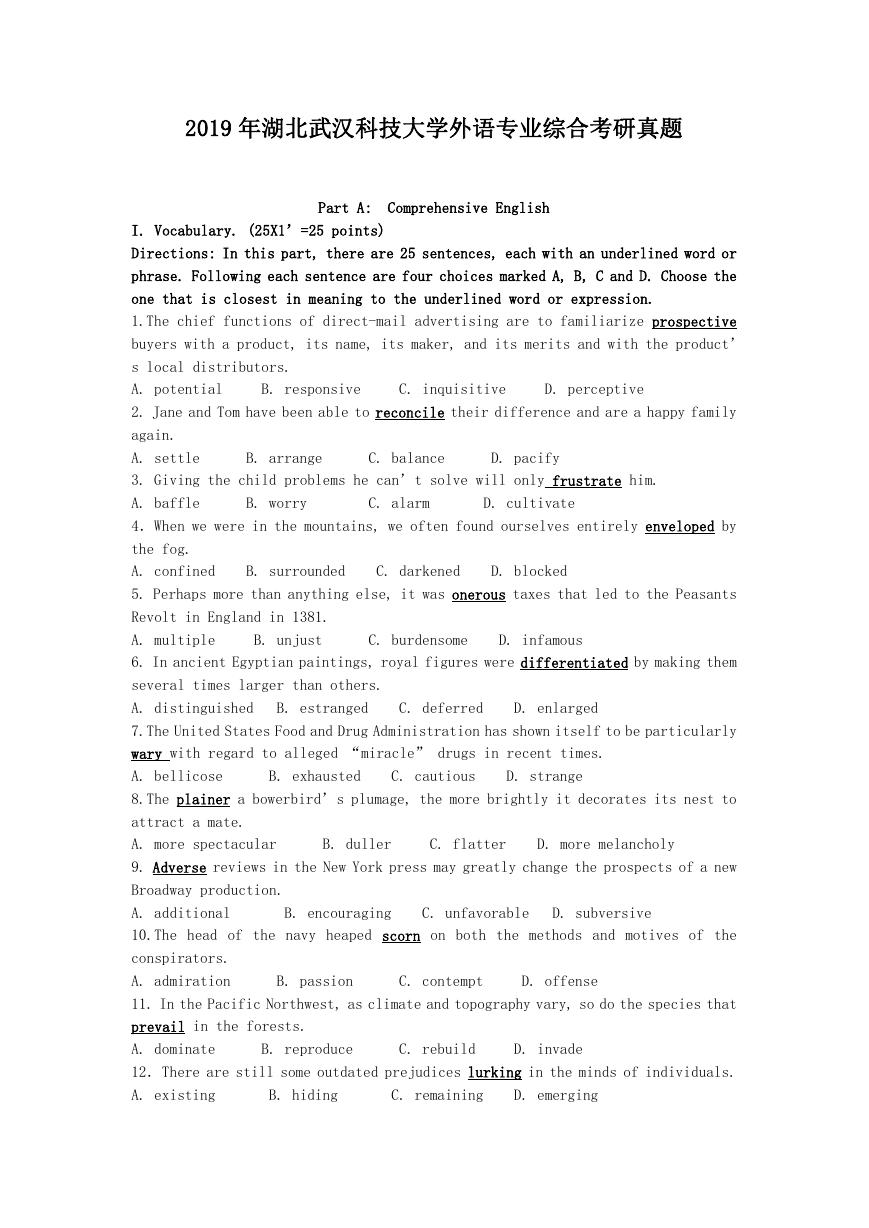
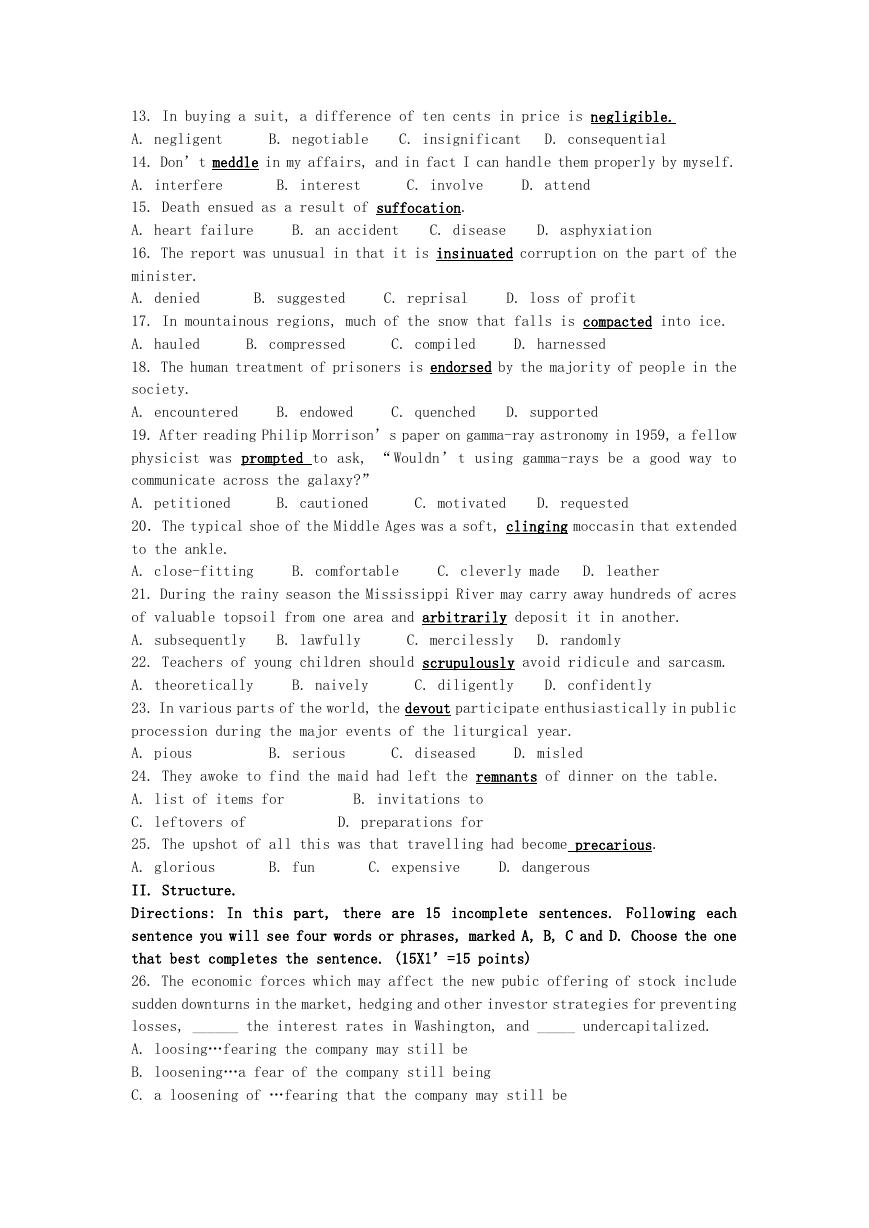
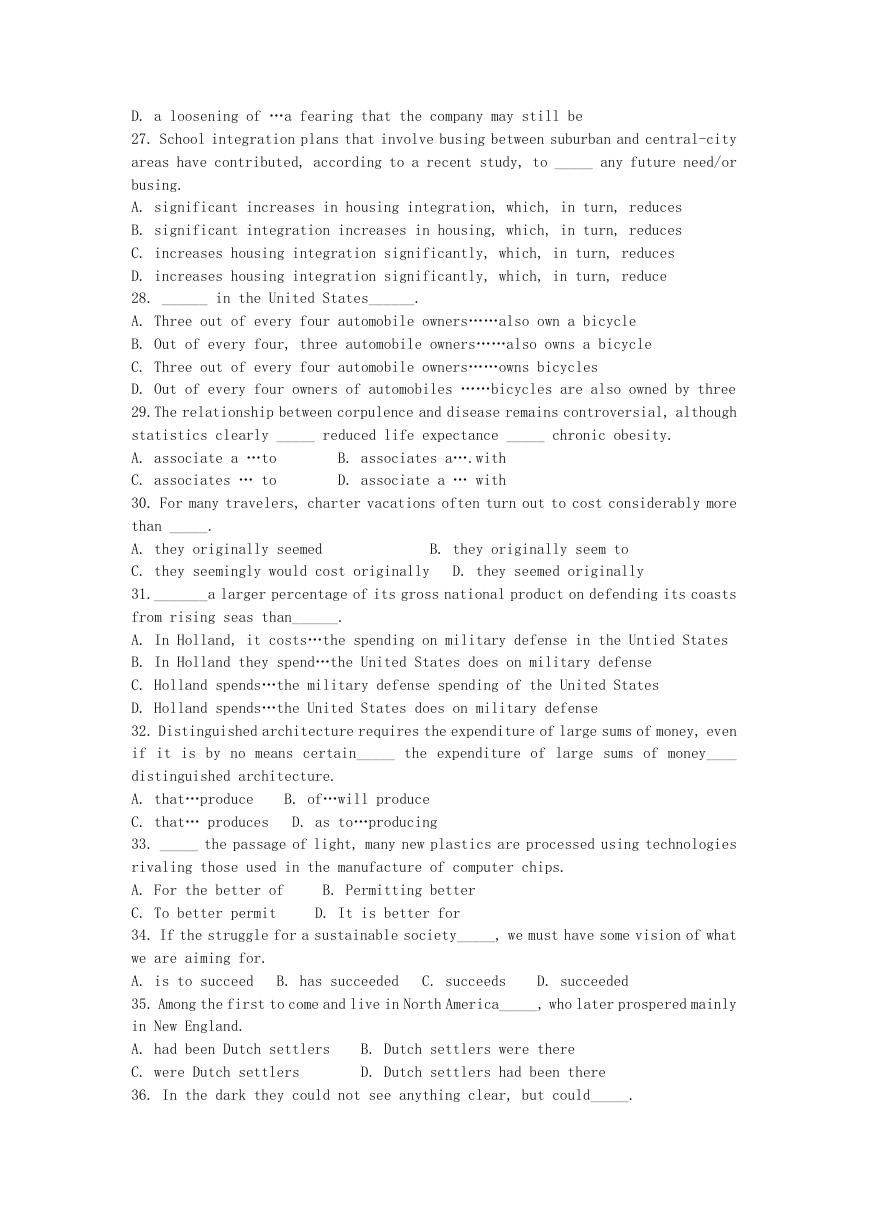
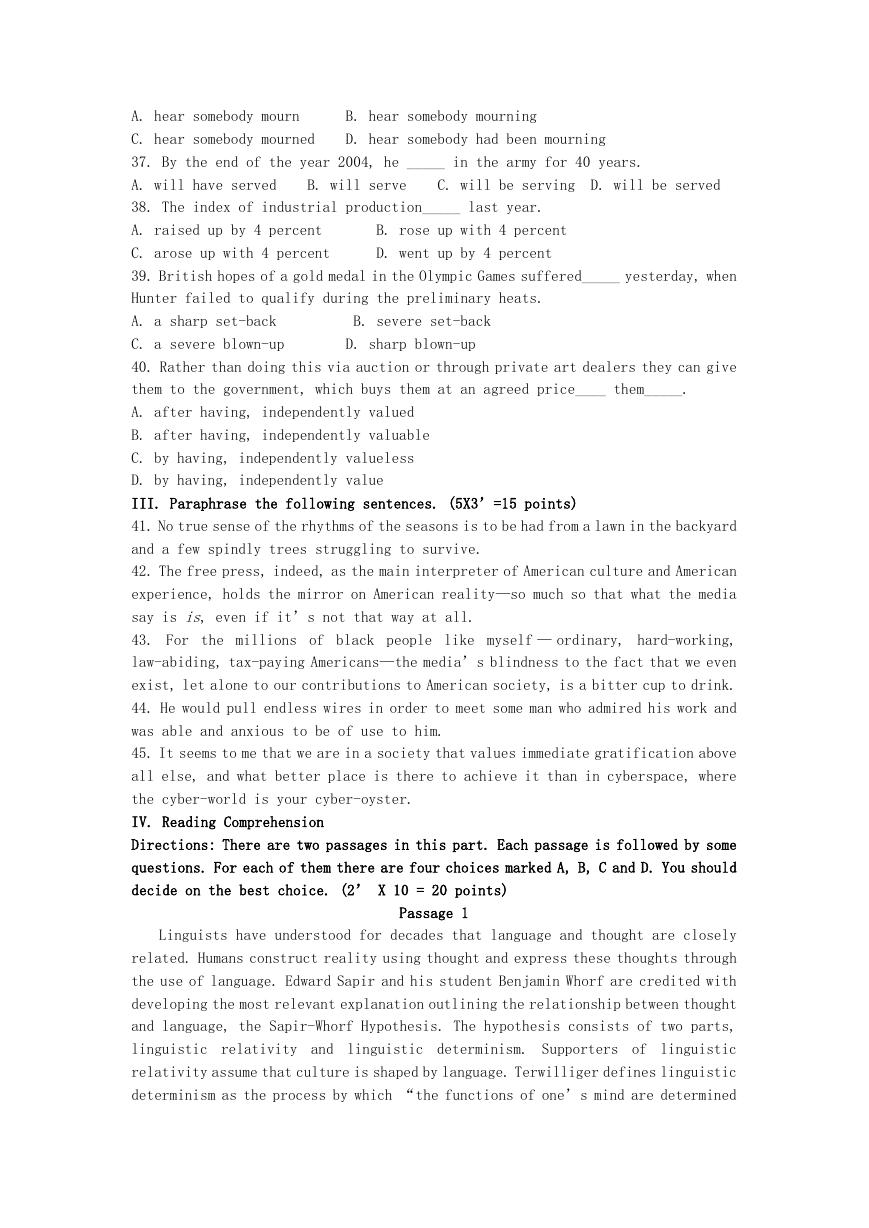

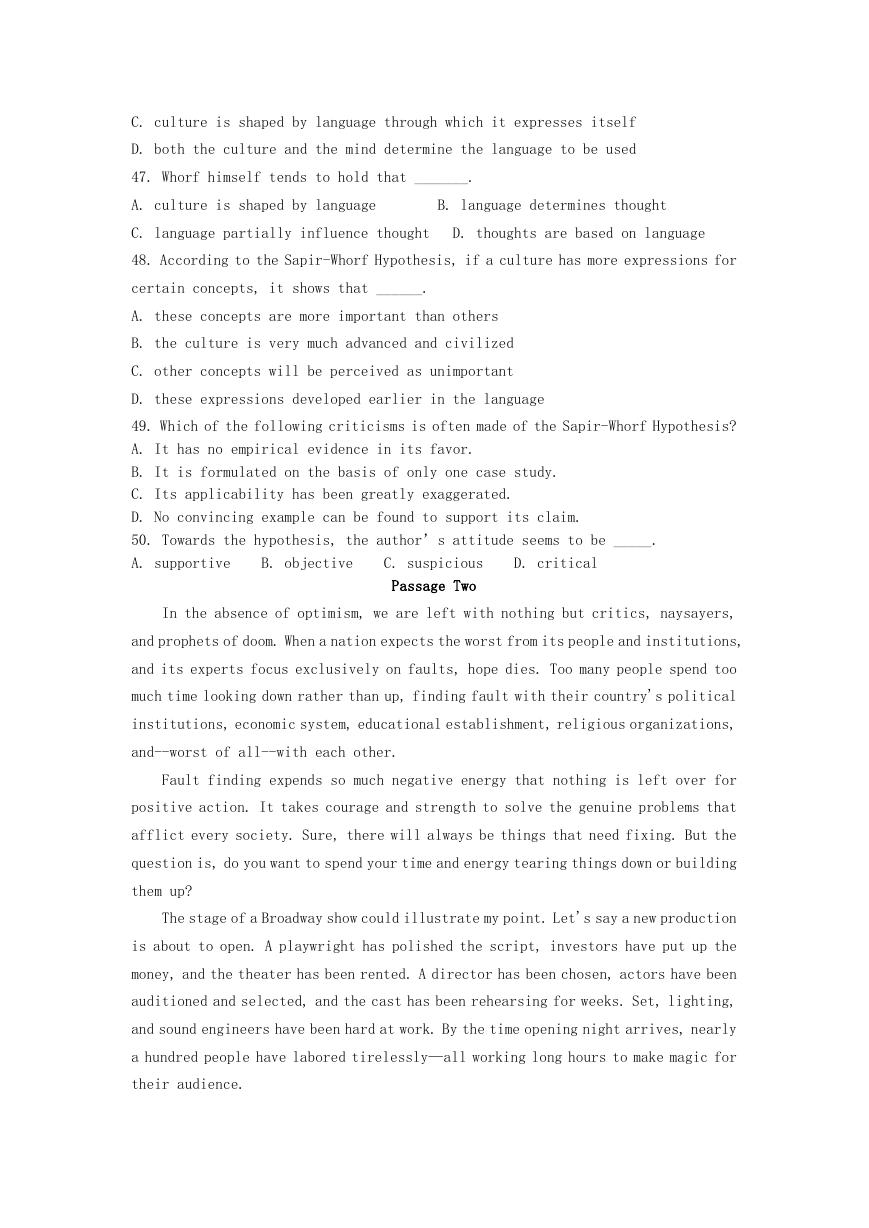
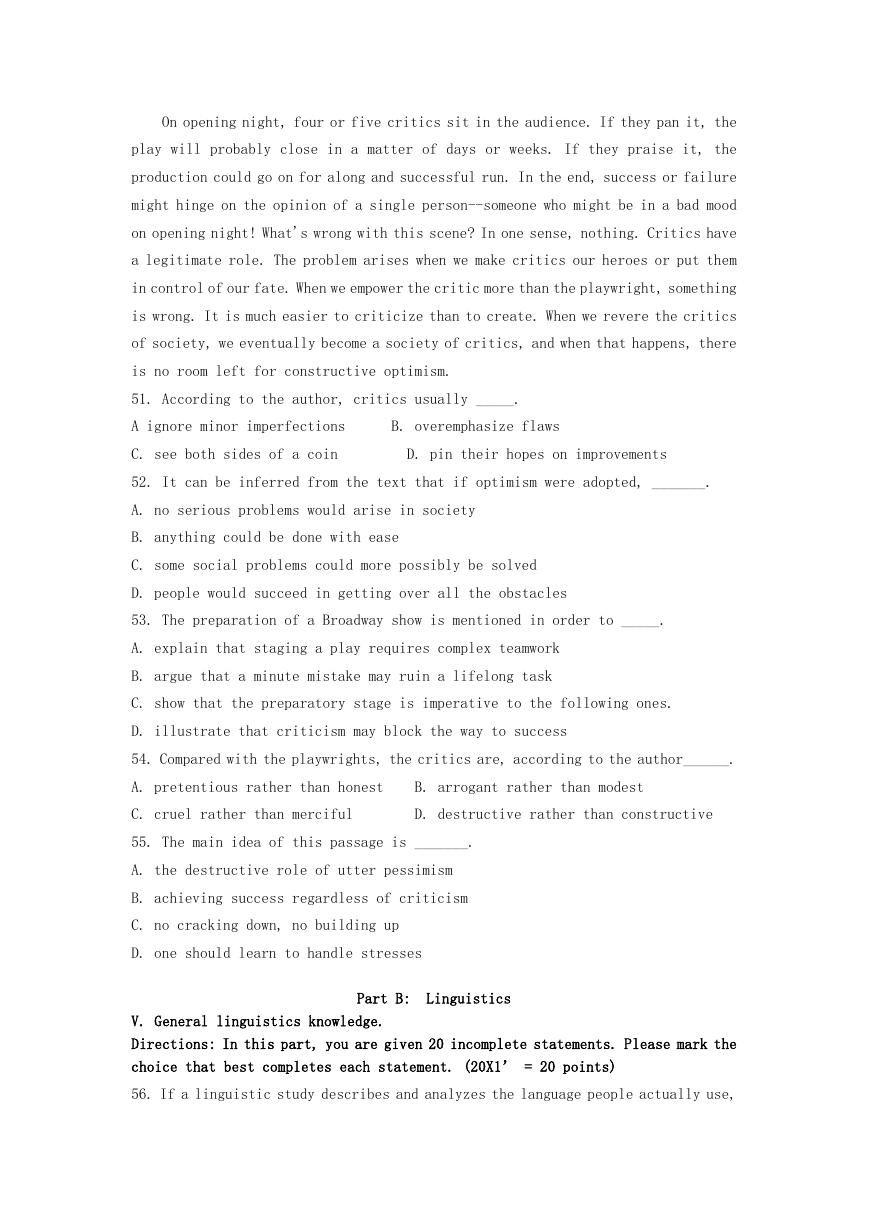
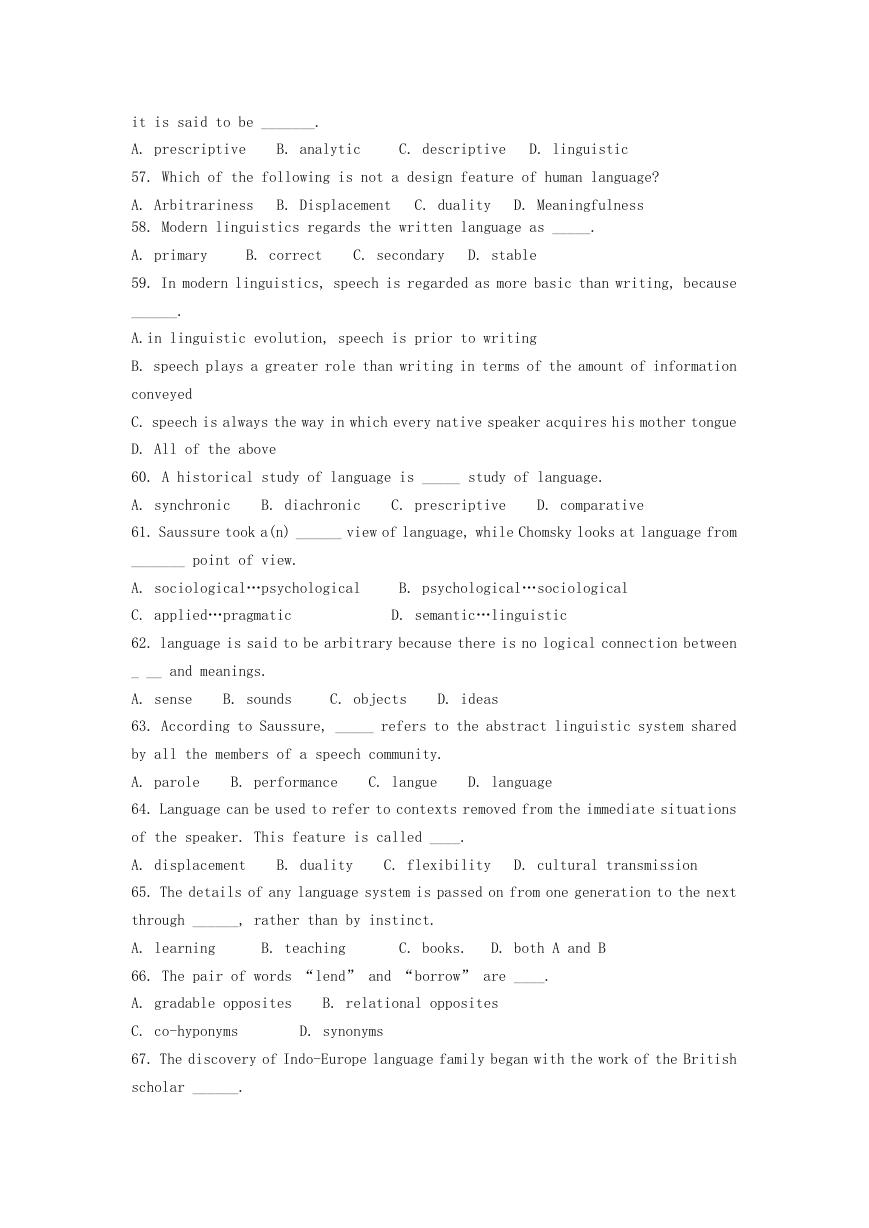








 2023年江西萍乡中考道德与法治真题及答案.doc
2023年江西萍乡中考道德与法治真题及答案.doc 2012年重庆南川中考生物真题及答案.doc
2012年重庆南川中考生物真题及答案.doc 2013年江西师范大学地理学综合及文艺理论基础考研真题.doc
2013年江西师范大学地理学综合及文艺理论基础考研真题.doc 2020年四川甘孜小升初语文真题及答案I卷.doc
2020年四川甘孜小升初语文真题及答案I卷.doc 2020年注册岩土工程师专业基础考试真题及答案.doc
2020年注册岩土工程师专业基础考试真题及答案.doc 2023-2024学年福建省厦门市九年级上学期数学月考试题及答案.doc
2023-2024学年福建省厦门市九年级上学期数学月考试题及答案.doc 2021-2022学年辽宁省沈阳市大东区九年级上学期语文期末试题及答案.doc
2021-2022学年辽宁省沈阳市大东区九年级上学期语文期末试题及答案.doc 2022-2023学年北京东城区初三第一学期物理期末试卷及答案.doc
2022-2023学年北京东城区初三第一学期物理期末试卷及答案.doc 2018上半年江西教师资格初中地理学科知识与教学能力真题及答案.doc
2018上半年江西教师资格初中地理学科知识与教学能力真题及答案.doc 2012年河北国家公务员申论考试真题及答案-省级.doc
2012年河北国家公务员申论考试真题及答案-省级.doc 2020-2021学年江苏省扬州市江都区邵樊片九年级上学期数学第一次质量检测试题及答案.doc
2020-2021学年江苏省扬州市江都区邵樊片九年级上学期数学第一次质量检测试题及答案.doc 2022下半年黑龙江教师资格证中学综合素质真题及答案.doc
2022下半年黑龙江教师资格证中学综合素质真题及答案.doc